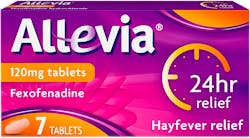Allevia 120mg 7 Tablets
Allevia 120mg 7 Tablets
All sizes
What 500,000+ customers say about medino:
Description
Allevia contains fexofenadine, an active ingredient that acts as a non-drowsy antihistamine. Fexofenadine blocks the release of histamine, which is responsible for causing allergic reactions, to relieve hay fever symptoms like sneezing, a runny or blocked nose, itchy eyes, and red and watery eyes.
Key features:
- Relieves hay fever symptoms
- Active ingredient: fexofenadine
- Non-drowsy antihistamine for everyday use
- Reduces sneezing, itchy nose, and watery eyes
- Effects start within 1 hour and last for up to 24 hours
What are the common symptoms of hay fever?
Common symptoms of hay fever include frequent sneezing, a runny or blocked nose, itchy, red or watery eyes, an itchy throat, mouth, nose and ears, and cough caused by postnasal drip. Less commonly, hay fever can also cause the loss of sense of smell, facial pain caused by blocked sinuses, headaches, earache, tiredness and fatigue.
What is Allevia used for?
Allevia, which contains fexofenadine. is an antihistamine medication that is commonly used to alleviate symptoms associated with allergies, such as runny nose, watery eyes, itching nose and eyes, sneezing, hives, and itching. It functions by blocking histamine, a natural substance that the body generates during an allergic response.
How long does it take for Allevia to work?
Allevia usually begins to work within an hour of taking the medication. However, the onset of relief may vary from person to person, and it may take longer in some cases.
Does Allevia require a prescription?
Allevia can be purchased over the counter (OTC) without a prescription. In the past, fexofenadine-containing medicines were classified as prescription medications, but this has recently been changed, and you can now buy without a doctor's prescription.
Ingredients
The active substance is fexofenadine hydrochloride. Each tablet contains 120 mg of fexofenadine hydrochloride.
The other ingredients are:
- Tablet core: microcrystalline cellulose, pregelatinised maize starch, croscarmellosesodium, magnesium stearate.
- Film coating: hypromellose, povidone K30, titanium dioxide (E171), colloidalanhydrous silica, macrogol 400, red iron oxide (E172) and yellow iron oxide (E172).
Usage and Instructions
Always take this medicine exactly as described in this leaflet or as your doctor or pharmacist have told you. Check with your doctor or pharmacist if you are not sure.
For adults and children aged 12 years and over
The recommended dose is one tablet (120 mg) daily. Take the tablet with water before a meal. This medicine starts to relieve your symptoms within 1 hour and lasts for 24 hours. Allevia is not recommended for children under 12 years of age.
Warnings
Talk to your doctor or pharmacist before taking Allevia if:
- you have problems with your liver or kidneys
- you have or ever had heart disease, since this kind of medicine may lead to a fast or irregularheart beat
- you are elderly
If any of these apply to you, or if you are not sure, tell your doctor before taking Allevia.
Other medicines and Allevia
Tell your doctor or pharmacist if you are taking, have recently taken or might take any other medicines.
Indigestion remedies containing aluminium and magnesium may affect the action of Allevia, by lowering the amount of medicinal product absorbed. It is recommended that you leave about 2 hours between the time that you take Allevia and your indigestion remedy.
Pregnancy and breast-feeding
Allevia should not be taken during pregnancy and whilst breast-feeding unless advised by a doctor.
Driving and using machines
Allevia is unlikely to affect your ability to drive or operate machinery. However, you should check that these tablets do not make you feel sleepy or dizzy before driving or operating machinery.
Allevia contains sodium
This medicine contains less than 1 mmol sodium (23 mg) per tablet, that is to say essentially ‘sodiumfree’.
Side Effects
Tell your doctor immediately and stop taking Allevia if you experience:
- swelling of the face, lips, tongue or throat and difficulty breathing, as these may be signs of aserious allergic reaction.
The following undesirable effects have been reported in clinical trials, with an incidence similar to those observed in patients who did not receive the drug (placebo).
Common side effects (may affect up to 1 in 10 people):
- headache
- drowsiness
- feeling sick (nausea)
- dizziness.
Uncommon side effects (may affect up to 1 in 100 people):
- tiredness/sleepiness.

